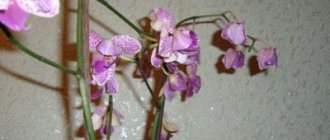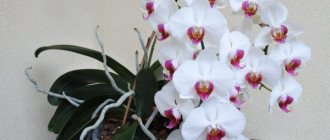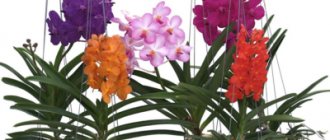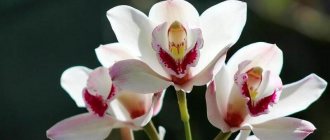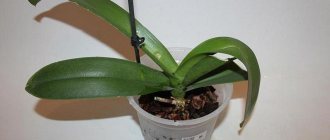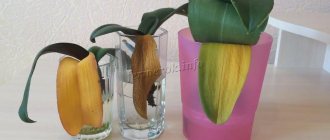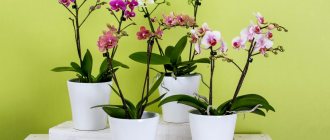- Reports
- Plants
- Orchids
Orchids are one of the oldest representatives of the flora of our planet; they appeared in the Late Cretaceous era. In our time, perhaps, only in Antarctica cannot these amazing plants be found. The greatest species diversity of orchids is found in the tropical zone. It was here, in the area of warm and humid climate, that the most favorable conditions for plant life developed.
In temperate latitudes, orchids are perennial herbaceous plants. They are attached to the soil by roots or tubers. In the tropics, orchids are most often epiphytes. Epiphytic orchids settle on tree branches and trunks. Their stems rise upward towards the sunlight, wrapping around the support plant and attaching to it with tendrils and hairs. In tropical forests, you can often see orchid flowers hanging from trees like a colorful garland. The aerial roots of epiphytes hang from the trunks, they absorb rain moisture and dew. Orchids do not harm the tree on which they settle. The main goal of a flowering plant is to get as close to sunlight as possible to carry out the process of photosynthesis.
The appearance of an orchid is its distinguishing feature. The leaves of the plant are simple and can be of different shapes and sizes depending on the species. They are located alternately on the stem. The stem of an orchid is also distinguished by its diversity; it can be either erect or creeping.
Orchid flowers are collected in inflorescences: spike-shaped or racemose. There are types of orchids that form only one flower (lady's slipper and cattleya). The sepals consist of three petals, which are of the same shape and size. The fourth, central petal is fundamentally different from the rest. It is formed by two or three petals fused together and has a bag-like shape. This part of the flower is called the “lip”. Often the lip contains nectar, which attracts pollinating insects with its aroma.
The orchid fruit is a dry capsule in which seeds are formed. The orchid holds the record for replacement productivity among flowering plants. Thus, one box can contain up to 4 million dust-like seeds. Interestingly, for orchid seeds to germinate, a prerequisite is their infection with a mycorrhizal fungus.
Orchids are beautiful flowering perennial plants. Therefore, it is not surprising that they have become one of the favorite greenhouse plants of humans.
general description
The description of an orchid should begin with the fact that the Orchidaceae family is the largest among flowering plant crops. There are about thirty thousand varieties. They are distributed throughout the globe because they can easily adapt to almost any climatic conditions.
The appearance and size of the flowers themselves may vary. Most representatives of indoor plants are epiphytic or epilithic. They have aerial roots (including). The root system is equipped with spongy tissue made of cells that are filled with air and absorb moisture well.
The stems of this plant are thickened and spindle-shaped. There are also swollen ones. Such flowers store nutrients along with moisture during the rainy season. Thanks to this ability, these plant crops survive the dry period every year without problems. They “deposit” reserves of moisture and nutrients in rhizomes or underground tubers.
The flowers themselves are built according to a “certain” pattern: three sepals alternate with three petals. There are one or two stamens, which grow together with the pistil style. The stigma of the pistil is located on the inside, under the anther.
Orchid flowers. article on the world around us
"Orchid flowers."
Orchids... Orchids are amazing plants that can be grown anywhere in the world. Difficulties can only arise in northern countries. At the moment, the plants are widespread in the tropics. Orchids easily adapt to new conditions. For example, vines, with the help of their tendrils, attach to trees and rise upward. Flowers hang down and fill the air with a pleasant smell. But not all orchids have a pleasant smell, since there are many types of them in nature.
Orchids are considered the flower of wealth and the rich, but they are actually wild flowers from the jungle. People just liked them so much that they began to grow them in greenhouses. Some orchids simply grow on tree trunks, but there are also those whose roots hang in the air. They almost feed on rain and dew.
Of particular interest is the appearance of the orchid. Flowers are like works of art and delight us with their beauty. They cannot leave anyone indifferent. The orchid has a very interesting structure. The flower attracts particular attention: the petals and sepals are arranged alternately around the center of the flower. And the shapes of these flowers are the most exquisite, very complex and differ depending on the type. They resemble either birds, or butterflies, or swans... Their size ranges from a few millimeters to 30 centimeters.
Orchids are symbols of femininity and feminine charm. They themselves are somehow associated with sultry, southern beauties. White, red, pink, orange, tiger, lilac, variegated, lilac, light purple... Perhaps, orchids are one of the most perfect creations of nature, and it is not for nothing that many call them “aristocrats” among plants.
Orchids are considered the flower of wealth and the rich, but they are actually wild flowers from the jungle. People just liked them so much that they began to grow them in greenhouses. Some orchids simply grow on tree trunks, but there are also those whose roots hang in the air. They almost feed on rain and dew. Most orchids do not require soil. Truly an airy flower. But orchids can grow in the mountains, and even underground! Truly, the sultry beauty of the orchid is hardy and patient. Not every plant is as resilient as this fragile flower with delicate petals and a soft core. An Englishman founded an orchid garden in his native country a hundred years ago. Now about eight hundred species of this flower are bred there, and there are very rare individuals. Imagine - a whole botanical garden, and it’s all filled with only orchids!
In Oceania, there are orchids that weigh up to two tons, and their sizes are measured in meters. And in our world there are also tiny orchids, only a millimeter in diameter.
The legend about the origin of orchids.
Orchids are amazing flowers, the history of which is shrouded in some mystery and mystery. These mysteries are associated with a huge number of legends and myths that arose in Ancient China, Latin America, and over time – in Europe.
*A beautiful legend about the origin of orchids originated in New Zealand. The Maori tribes, fascinated by the beauty of orchids, were confident of their divine origin. Long ago, long before the advent of humans, the only visible parts of the earth were the snow-capped peaks of high mountains. From time to time, the sun melted the snow, thereby causing the water to rush down from the mountains, forming amazing waterfalls. Those, in turn, rushed in seething foam towards the seas and oceans, after which, evaporating, they formed curly clouds. These clouds eventually completely obscured the view of the earth from the sun. One day the sun wanted to pierce this impenetrable cover. Heavy tropical rain began to fall. After it, a huge rainbow formed, hugging the entire sky. Admired by the hitherto unprecedented spectacle, the immortal spirits - the only inhabitants of the earth at that time - began to flock to the rainbow from all, even the most distant lands. Everyone wanted to grab a spot on the colorful bridge. They pushed and cursed. But then everyone sat down on the rainbow and sang together. Little by little, the rainbow sagged under their weight until it finally collapsed to the ground, crumbling into a myriad of small multi-colored sparks. Immortal spirits, who had never seen anything like this before, watched with bated breath the fantastic multi-colored rain. Every particle of the earth gratefully accepted the fragments of the heavenly bridge. Those that were caught by the trees turned into orchids. This is where the triumphal procession of orchids across the earth began. There were more and more colorful lanterns, and not a single flower dared to challenge the orchid’s right to be called the queen of the flower kingdom.
*Long before humanity came into the world, the only visible parts of the earth were the tops of snow-capped mountains. The sun's warm rays melted the snow from time to time. The water flowed down from the mountains in a stormy stream, and amazingly beautiful waterfalls were formed. These waterfalls carried their waters into the seas and oceans; the reservoirs, in turn, evaporated and formed curly clouds. This went on for a very long time, until the clouds obscured the Earth from the Sun. But the Sun wanted to break through this curtain. It sent heavy tropical rain down to earth from the heavens. After him, a beautiful rainbow appeared in the sky. At this time, only Spirits lived on Earth. The rainbow was so beautiful and large that it could be seen from any point on earth. The spirits were surprised and fascinated by the rainbow, they began to fly closer to it. Everyone wanted to grab a piece of it. They pushed and swore, but in the end, everyone found their place on the rainbow and they sang together. Rainbow sagged under this weight. At one point she could not stand it and fell to the ground, breaking into millions of multi-colored bright sparks. The spirits watched this unprecedented spectacle with bated breath. Every particle of the earth, every stone and tree received a piece of the heavenly rainbow. Those particles that were accepted by the trees turned into amazing flowers - orchids.
*******
In different countries, the plant is given specific symbolism. For example, in China, orchids are a symbol of the beginning of spring, as they bloom before the start of the new year. According to Feng Shui, an orchid can be grown in all rooms, as it is a symbol of harmony. Europeans endow the flower with such traits as perfection and divinity. In some Latin American countries, the orchid is a national symbol. In Russia this flower is also loved and revered. Here it is a symbol of love, family comfort, sophistication and wisdom. Orchids are very often used as gifts for dear people.
Orchids are miracle flowers! They give positive emotions and real joy. When I look at blooming orchids, this beauty always lifts my spirits.
Homeland of the plant and history of distribution
The place of origin of such plants is considered to be South America. It was here, in the tropics with high relative humidity, that they began to grow on tree branches. From tropical forests they gradually spread throughout the world. Several years ago, orchids were considered very difficult to care for and required exclusively wild natural conditions. But thanks to experienced flower growers, such plant crops began to be grown in North America, Australia and Europe, and in indoor conditions.
Orchids were first brought to European countries about 400 years ago. But in those days, no one imagined that this plant could grow at home. In the modern world, the flower has become one of the most common indoor plants.
One of the key features of this flower is its many varieties. Everyone can choose the most beautiful variety suitable for growing at home. Various varieties grow throughout the globe. The only exceptions are the Far North and deserts.
Popular message topics
- Yashin Lev
Lev Yashin is the best legendary Soviet football goalkeeper. His name is included in the list of the best players of the 20th century. He is the first and only person to receive the Ballon d'Or award. - The Tale of Bygone Years
The Tale of Bygone Years was conceived by the chronicler Nester at the beginning of the 12th century. He served as a monk in the Kiev-Pechersk Lavra, and is the first chronicler in Rus'. He was endowed with modesty, holiness and a special gift from God. - City of Surgut
Surgut is the largest city by population in the Khanty-Mansiysk Autonomous Okrug (often called “Yugra” or “Yugoria”). From the Khanty language the word “Surgut” is translated as “fish place”. This is one of the richest cities in Russia
Advantages and disadvantages of a flower
Like any other flower, the orchid has a number of advantages and some disadvantages. The latter often force one to abandon the idea of growing such flowers at home in a closed system. Among the advantages it should be noted:
- unusually beautiful large flowers;
- very pleasant aroma;
- long flowering period;
- no need for annual plant replanting;
- there is no need to water such a plant crop too often;
- Problem plants whose leaves have begun to turn yellow and fall off can be easily restored.
The main disadvantage of this flower is its demanding growing conditions. If mistakes are made, the plant can die quite quickly. Another disadvantage is the fragile foliage, which is prone to falling and changing color. Orchid leaves are very easily damaged.
In addition, you should know that orchids are prone to rotting of the root collar and root system. The lower leaves die quickly when over- or under-watered. Small midges may appear on the plant, which damage the flower.
Similar articles
Vitamin bomb or how to make a cocktail for orchids
How to properly use moss for orchids
How long do orchids live at home?
Review and description of the main varieties of phalaenopsis orchids
Variety of orchids and their features
- Vanda is the queen among all orchids. Anyone who saw this flower for the first time in their life will be surprised by Wanda’s appearance. The whole point is that this orchid grows in nature with absolutely bare roots. This plant feeds on moisture from the external environment - rain, fog and bird droppings. That is why the flower does not need any substrates or support. Such orchids bloom at any time of the year, and flowering lasts up to 3 months. Due to the fact that such an orchid is capable of not withering for a long time, it is today the most common representative of orchids.
- Cattleya has recently become very popular among orchids. This type of plant is quite showy, with large flowers, and its color varies from white to bright red or dark purple. With rational care, at the end of summer - at the beginning of autumn, covers appear on the orchids, which can form until mid-winter. After such unusual orchids fade, they need time to rest, and therefore they will have to reduce watering and remove fertilizing until new shoots appear.
- Cymbidium is a tall and large orchid that has long, pointed leaves and closely grouped ovoid-shaped pseudobulbs. You can find miniature species of such orchids, and plants reaching a height of up to one meter. Peduncles of this species have been used as cut flowers for bouquets for many years. This is due to the fact that Cymbidium is a persistent flower. In addition, he is unpretentious in care.
- Dendrobium is an equally exotic variety of orchid. Dendrobium is a sympodial plant that reaches an average height of 30 cm. This flower prefers moderately cold air temperatures. The color range of such an orchid can vary from white to purple, but bright yellow and orange specimens are also found.
Abstract of the GCD “Orchid flower. Houseplants" for pre-school group
Olga Kravtsova
Abstract of the GCD “Orchid flower. Houseplants" for pre-school group
GCD Topic: “
Orchid flower ” (
indoor plants ) in
the preparatory school group .
Kravtsova Olga Mikhailovna
1. Expand children’s understanding of indoor plants
2. Continue to teach children to develop creative activity through
3. Help expand children's knowledge about indoor plants .
4. Contribute to the formation of an idea of the importance of indoor
colors;
5. Development of children's creative abilities.
6. Development of fine motor skills of the fingers.
Equipment and materials:
photos of children with indoor flowers , illustrations of indoor flowers , D.I. “Collect a flower ”
, sheets with blanks for pots
of indoor flowers , scissors, a simple pencil, glue, colored paper , musical accompaniment: classical music - Melody for Flowers .
Conducting a thematic conversation “ Indoor plants ”
Watch the video material “How to care for indoor plants ”
Selection of photo material depicting children how they care for plants at home .
Consideration of the album “ Plants that came to us from warm countries”
Care after disembarkation
After planting the orchid, it needs to be provided with appropriate care. If the flower is provided with optimal conditions, then it needs to be watered once every two weeks. This procedure is carried out only when the substrate dries. The orchid needs abundant watering. The root system of the plant will tell you about the characteristics of moisture.
When the roots are green, you can judge whether watering is sufficient. If the color of the roots turns brown, then it is necessary to reduce the frequency of watering. To water the orchid, you must use settled tap water, the temperature of which is from 22 to 24 degrees. To avoid infection of the foliage of the crop with rot, it is not recommended that water come into contact with it. That is why watering the plant should be done as carefully as possible.
In order to stimulate the plant to bloom, it must be placed in a cool place and watering reduced. To feed the orchid, you must use special liquid fertilizers, which can be purchased at a specialty store. The procedure is recommended once a month. If the desire arises, you have the opportunity to prepare the fertilizer yourself.
During the growing season, it is recommended to apply nitrogen fertilizers. After a certain time, the root system of the flower grows, which requires replanting. For this purpose, it is necessary to use a container that is slightly larger in diameter than the previous one. A drainage is placed at its bottom, to which the flower is attached. After this, it must be covered with soil.
The orchid is a unique flower with which you can decorate any room. Caring for an orchid is quite simple, and therefore any gardener can do it. In this case, the plant must be provided with optimal growing conditions, as well as watering and fertilizing, which will lead to abundant flowering.
How to draw an orchid? Techniques for children
Drawing flowers is fun. Even a child can draw an orchid. Take a sheet of paper, a simple pencil and an eraser. Follow the instructions and everything will work out.
And here is the process of creating a masterpiece and its brief description for children:
- In the middle of the leaf we draw the stem of the orchid in the shape of a curved line;
- Next to it we draw a second line, identical to the first, thus indicating the volume of the figure;
- Draw a small circle on top;
- On the finished circle we draw small buds with antennae, 4-5 pieces;
- Now it’s the turn of the petals: three large ones at the top, two smaller ones at the bottom;
- Add leaves to the stem and the orchid is ready;
- Color the drawing.
